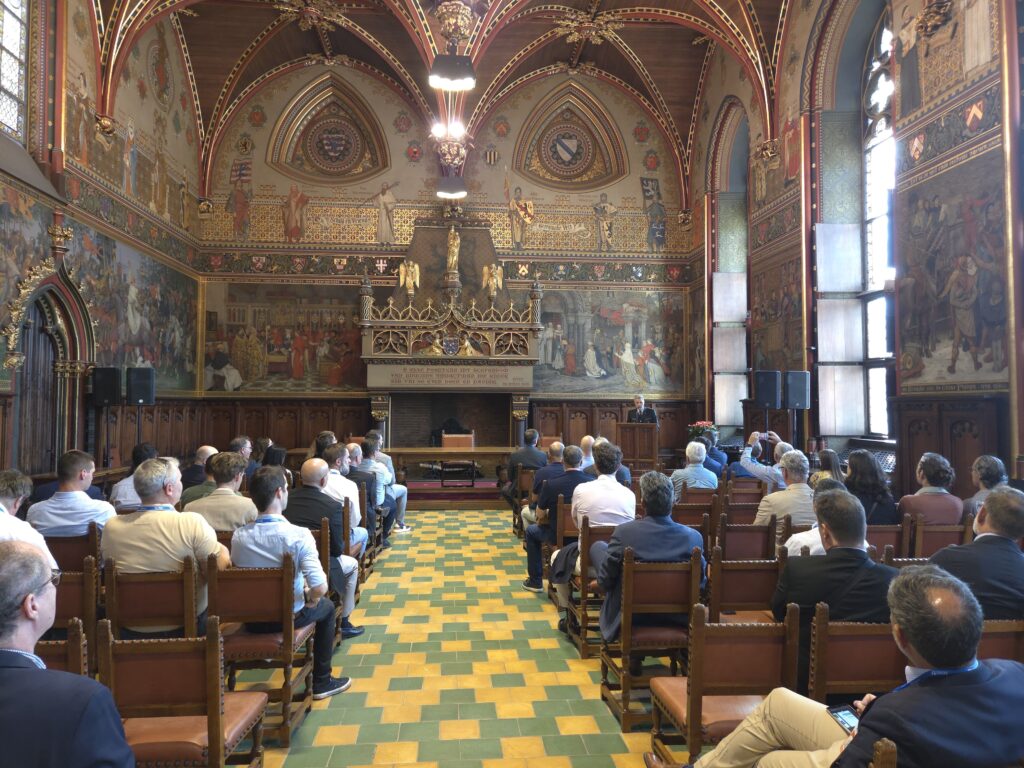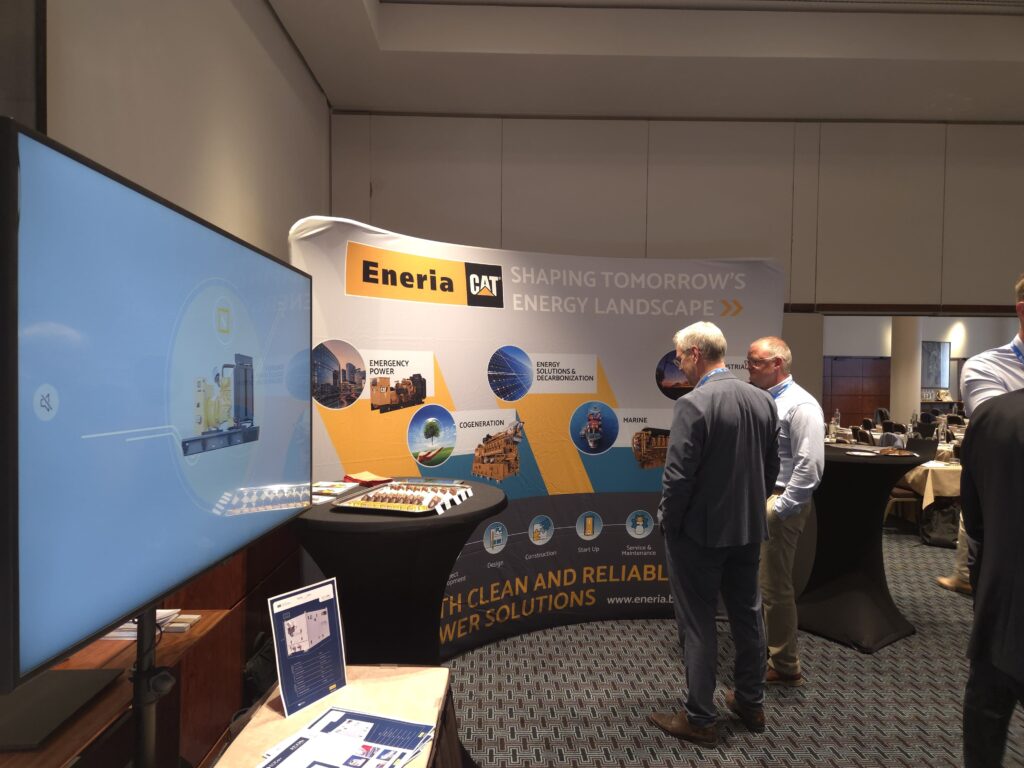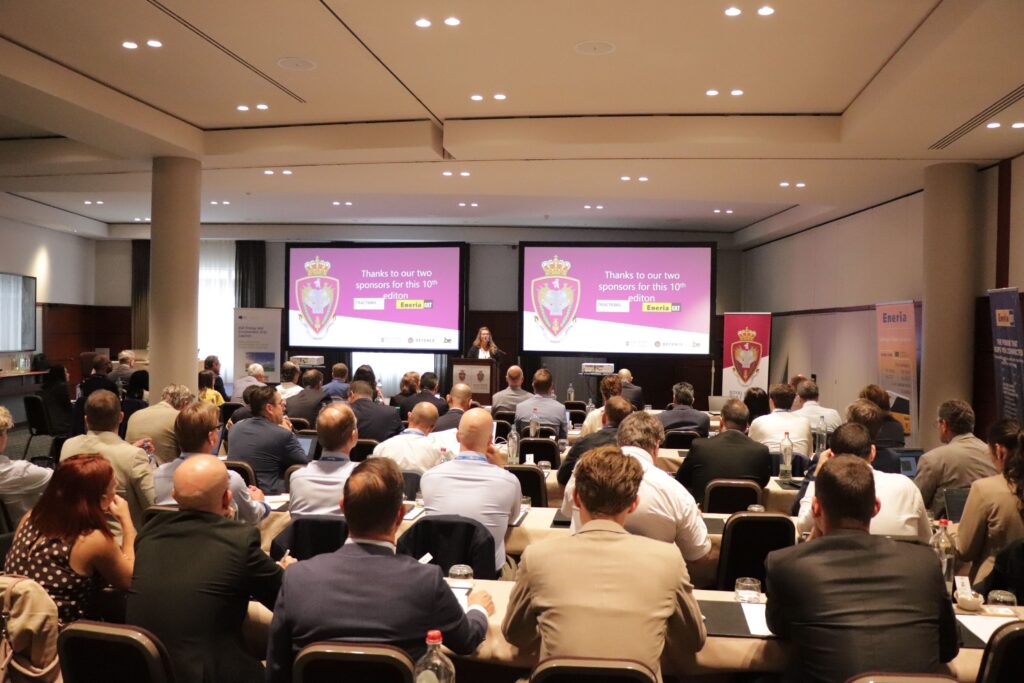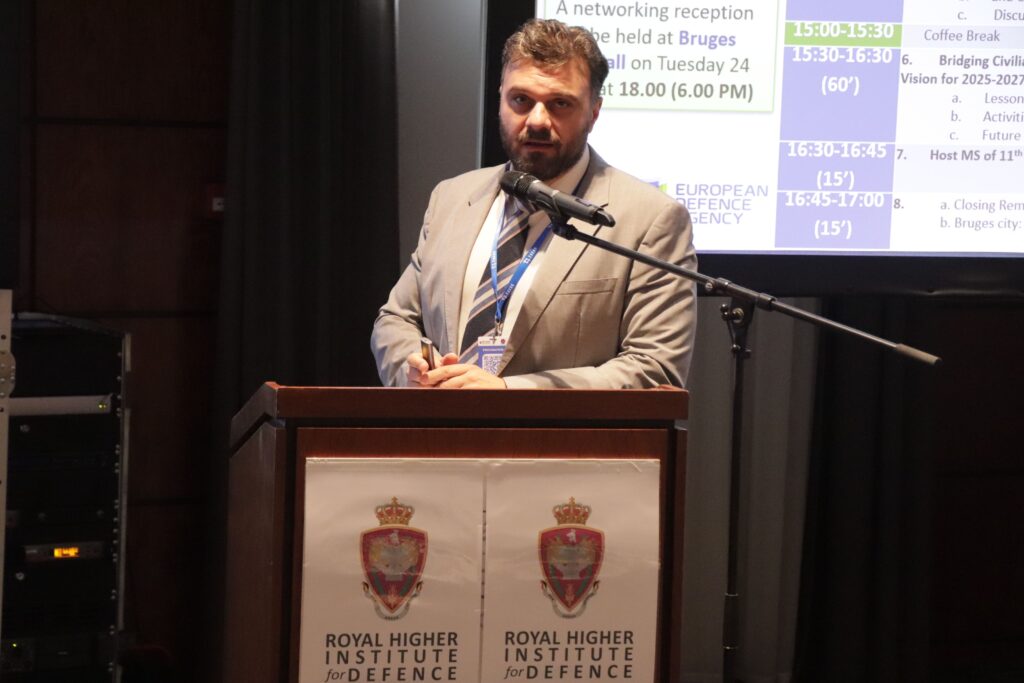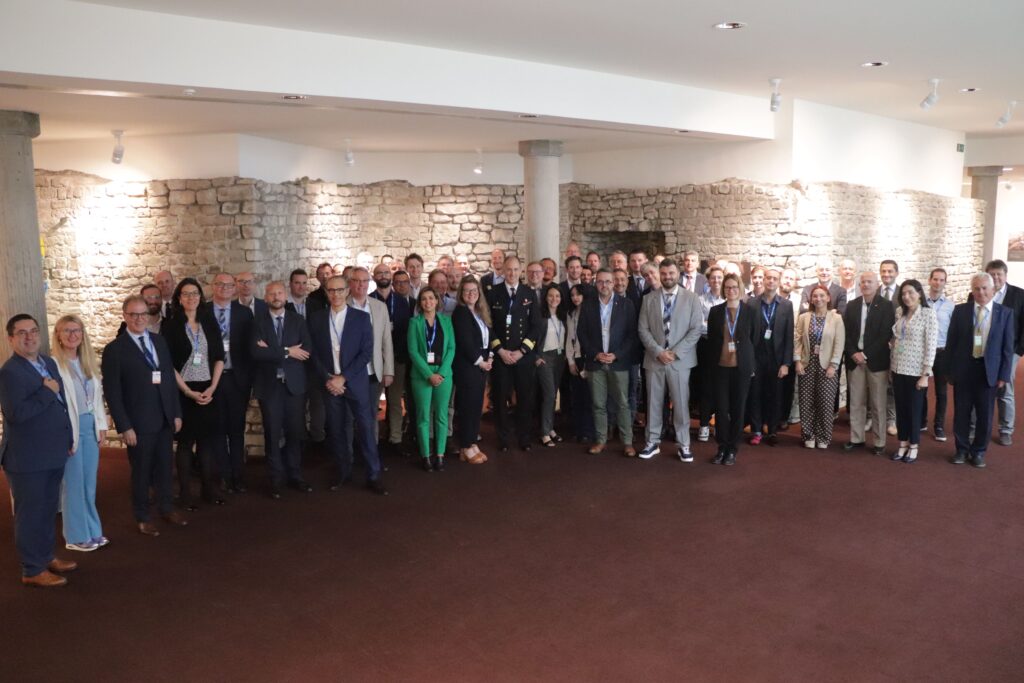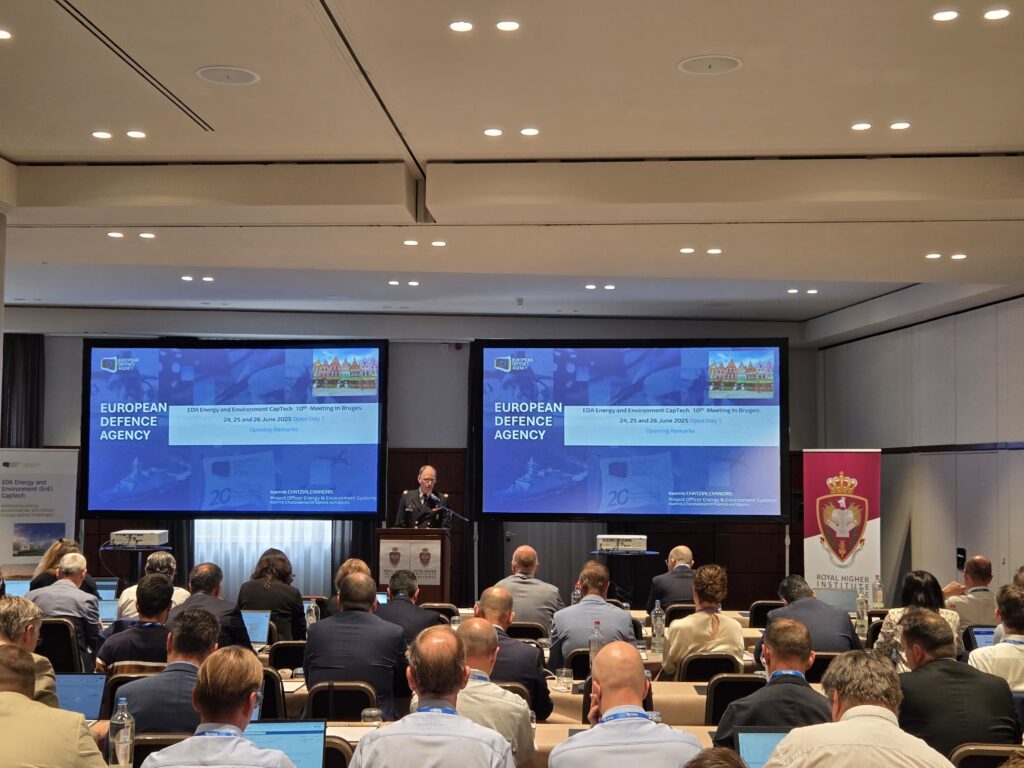
The CapTech Energy and Environment: a vision for a sustainable defence
From 24 to 26 June 2025, the city of Bruges hosted the 10th edition of the CapTech Energy and Environment (EnE), organised by the Royal Higher Institute for Defence (RHID). This strategic meeting brought together the principal European players in the fields of defence, industry and research, with the aim of advancing energy autonomy, environmental sustainability and operational resilience of the armed forces.
The CapTech EnE as a response to geopolitical and climatic challenges
The CapTech EnE is an initiative of the European Defence Agency (EDA) that aims to respond to the energy, environmental and climatic challenges that the armed forces face. It is a collaborative platform that brings together industry and research experts as well as Ministries of Defence from several European Union countries. Each player has the opportunity to propose joint research projects and to promote innovative solutions. The CapTech EnE focuses on three major areas: operational energy, energy efficiency and reducing the environmental impact of military activities, with the aim of strengthening the resilience, autonomy and sustainability of Europe’s defence capacities.
Against a backdrop of geopolitical tensions, notably the war in Ukraine, the question of energy independence has become crucial for the European Union. The historical dependence on Russian fossil fuels has exposed the vulnerability of the EU Member States. The CapTech EnE fits into this dynamic of a strategic transition towards renewable energy sources, related to the European roadmap on energy security and the objectives of technological sovereignty.
The RHID, an energy innovation catalyst for Defence
The Royal Higher Institute for Defence (RHID) plays a fundamental role in this transformation. In supporting research and development for the Belgian Defence, our Institute helps to define the technological priorities of the CapTech EnE, particularly in the fields of operational energy, energy efficiency and reducing the environmental impact of military activities.
CapTech Day 1 – Introduction and vision on a sustainable defence
The first day of the CapTech Energy and Environment was marked by the official opening of the 10th edition by Rear Admiral Baudouin COPPIETERS, Director General of the RHID. During the morning, participants were given an overview of the different European initiatives related to sustainable energy, with presentations by NATO, the European Union Military Staff (EUMS), the Joint Research Centre (JRC) and several Member States. During the afternoon, light was shed on key technologies like micro-arrays for military camps, small modular reactors (SMRs) and strategic research priorities (SRIA). Finally, the rapporteur from the industry presented the work that had been done over the past two years, before outlining the priorities for 2025-2027 in detail.
Day 2 – Collaborative projects and technological priorities at the heart of the discussions
The second day was dedicated to internal work by the members of the CapTech Energy and Environment, with a particular focus on the collaborative projects and orientations to come. The participants shared their views on operational studies, notably on energy storage, and discussed several ongoing projects. Technological projects highlighted innovative solutions for supplying energy to military infrastructures. During the afternoon, participants worked in smaller groups, where representatives of government and industry discussed the CapTech objectives, the intellectual property processes and the future research priorities, with a particular emphasis on micro-arrays, solid batteries and sustainable networks.
Day 3 – Belgian innovation in the spotlight
Focus on concrete innovation and solutions in the field: the last day of the CapTech EnE highlighted the most promising technologies for strengthening the energy resilience of the armed forces.
Eneria stood out with an ambitious presentation on flexible energy production and alternative solutions for decarbonising military operations. Drawing on its expertise in hybrid energy systems and intelligent energy management, the Belgian company showed how technologies can meet the mobility and autonomy requirements of military environments.
Tractebel presented an ambitious vision for strengthening Europe’s energy autonomy thanks to nuclear solutions that are clean, safe and modular. The Belgian company, which is renowned for its expertise in nuclear engineering and energy transition, pointed out the potential of small modular reactors as a response to the requirements of critical defence infrastructures. These technologies, which are designed to be deployed rapidly and safely, offer a stable, carbon-free source of energy.
The Defence Laboratories (DLD), a key partner of the RHID in the field of technological research, presented a system for producing hydrogen that is based on sunlight and air humidity and capable of supplying a military base with heat and electricity. The Defence Field Accommodation Unit, meanwhile, showcased a Belgian hybrid system that is designed to optimise the energy autonomy of deployed infrastructures.
In addition to the Belgian presentations, the third day of the CapTech also featured several promising European innovations. The KU Leuven presented its HYDE project, which focuses on hydrogen-based energy and water production for military camps. Mitis PLC introduced participants to flameless combustion microturbines which allows for a decentralised energy supply, whereas Cenaero shared its work on eco-efficient and resilient military infrastructures. Solenco Power, meanwhile, unveiled its Solar Energy Box, a modular hub combining energy and water for tactical deployments. This dynamic was continued in the afternoon via presentations on technologies such as the reverse Brayton cycles, sustainable aircraft fuels, lithium-metal batteries or even portable solutions for energy integration, thus highlighting the wealth of the European ecosystem in terms of sustainable defence.
A regional dynamic: West Flanders in the front line
The province of West Flanders, which hosted this 10th edition of the Captech Energy and Environment, fully embodies the idea of integrating energy issues into the development of Belgium and Europe. Indeed, it is home to multiple offshore wind farms in the North Sea, which contribute to the green electricity production of our country. The innovative Princess Elisabeth Island is also situated in West Flanders; it is a technological hub aimed at centralising and redistributing energy generated at sea. The province also plays a key role in energy security, thanks to the Belgian Navy’s commitment to protecting critical infrastructures at sea. Finally, the RHID would like to express its sincere thanks to the town of Bruges for having warmly welcomed all participants and offering them a glass at the end of the first day.
Conclusion: towards a sustainable and sovereign European defence
The CapTech EnE 2025 showed that the energy transition is not just an environmental obligation, but also an important lever for European security and autonomy. The RHID, along with its partners such as Eneria, Tractebel and KU Leuven, asserted itself as a player in this transformation by linking research, innovation and the operational needs of the armed forces.
